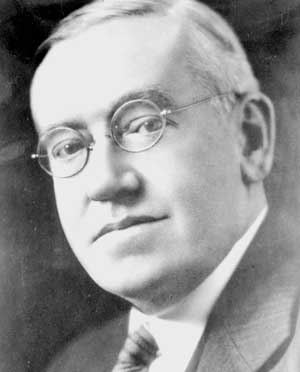John Francis Dore served as Mayor of Seattle twice during the Great Depression. He entered office a staunch advocate of fiscal economy (budget cuts), but he lost reelection after he alienated the unemployed (by allying himself with business) and city workers (by cutting their pay). Later, he changed his positions and with labor support, won election a second time.
Boston to Seattle
Dore was born December 11, 1881, in Boston and migrated to Seattle with his family at the age of 12. He was educated in the East at Phillips Exeter Academy and at Harvard University, but returned to Seattle in 1903 to work as a journalist. While writing for the Seattle Post-Intelligencer and other papers, he studied law. He was admitted to the bar in 1910. Dore became one of the most respected and successful trial attorneys on the West Coast. His introduction to politics came in 1924 with an appointment to the parks board.
In 1930, Dore announced a campaign for prosecuting attorney and he pledged to serve without pay. His candidacy did not result in nomination, but it did generate the last of three efforts to have him disbarred. His opponents claimed that his offer to serve without pay constituted an attempt to bribe the electorate. Dore was cleared of the charges.
The Great Depression in Seattle
In 1931, voters recalled Mayor Frank Edwards from office over his firing of popular Seattle Light Superintendent James D. Ross (1872-1939). Seattle and the rest of the nation were in the midst of the Great Depression. Thousands of people were out of work, overwhelming the traditional city, county, and private relief agencies. Many families had lost their homes for want of mortgage and tax payments. Confidence in the economic and political systems was shaken and groups such as the Unemployed Citizens League attracted many of the disaffected. Dore announced, "I'm in favor of taking the huge fortunes away from those who stole them from the American workers" (Berner, 307) and he proposed tax cuts and public works programs.
Dore, a Democrat, ran for the mayor's office in 1932 against Edwards's appointed replacement, Robert Harlin. Harlin lost labor support when he used police to break up protest meetings near the City-County Building and then banned meetings altogether. Dore's pronouncements appealed to the unemployed and he won handily.
Dore demanded that Harlin resign so that he could take office immediately and he took the case to the Supreme Court, but lost. On June 6, 1932, Dore held an unprecedented inaugural ceremony at one minute after midnight. He promptly appointed a new police chief "to clean up the city" (Seattle P-I). He cut the pay of municipal workers by 16 percent (later restored in court action) and he cut the city budget by $2.5 million.
Dore and Tacoma Mayor M. G. Tennent organized Puget Sound mayors to get Governor Roland Hartley to help with relief, but they were not successful. Dore supported business approaches to relief, and he clashed with the Unemployed Citizens' League over who would control the distribution of relief efforts. But Dore alienated the unemployed and labor when he opposed a march through Seattle by the Unemployed Citizens' League. Businessmen who felt Dore couldn't be trusted joined with organized labor in opposing Dore for reelection in 1934 and he lost to Charles L. Smith.
Dore Becomes Labor's Man
On May 9, 1934, during the last days of Dore's first term, Longshoremen all along the West Coast went on strike. The work stoppage quickly expanded to the off-shore unions. Ports up and down the coast closed. Dore requested federal troops, but refused to ask for national guard assistance from Republican governor Hartley, claiming that Seattle police were up to the task. Dore left office less than a month later.
Dore returned to his private law practice and laid plans to return to office. Building an alliance with Teamster leader Dave Beck (1894-1993), he campaigned in 1936 on a labor platform and he promised city workers that there would be no wage cuts. After he beat incumbent Mayor Charles Smith, he promised, "I am going to pay back my debt to Dave Beck and the teamsters in the next two years regardless of what happens."
When members of the American Newspaper Guild struck the Seattle P-I on August 13, 1936, he kept police away from the scene and even joined pickets around the P-I building. Picket lines expanded to The Seattle Times and The Seattle Star. In the absence of police, violence occurred. The papers eventually settled.
Dore's second term began with close ties to Beck and to the American Federation of Labor, and to Harry Bridges and the Congress of Industrial Organizations. When a split between the AFL and the CIO came, Dore stuck by Beck and the AFL. He sent police to protect plants from CIO pickets and he announced flatly that AFL forces would rule in Seattle. Dore's support contributed to Beck's rise in power in Seattle.
Dore's relationship with the city council faired no better in his second term. The council opposed many of his appointments and it also backed Proposition A, a measure to refinance and rebuild the street railway system. Dore opposed it as "a swindle" (Berner, 397) following the lead of the transit workers union, which feared a loss of jobs if the system switched from streetcars to trackless trolleys and motor coaches. The measure failed.
Dore suffered from failing health, which prevented him from effectively serving as mayor beginning in November 1937. This did not stop him from filing for reelection. His illness prevented him from actively campaigning and he lost in the February 1938 primaries.
John Dore died on April 18, 1938 of complications from influenza and pneumonia while still in office. Mayor-elect Arthur B. Langlie was appointed by the city council to succeed him.

